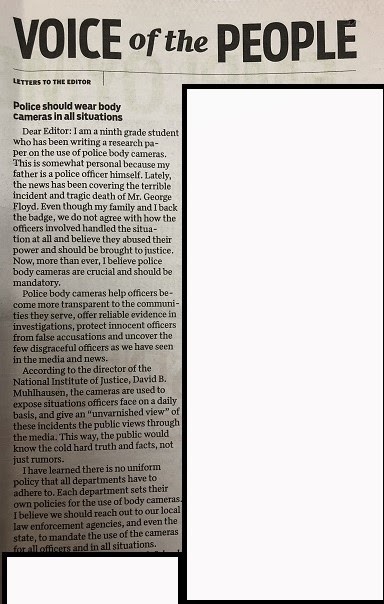By: Stephanie Hurt, Greater Madison Writing Project
Getting student voices out into the world is something many teachers strive to do. An immediate, highly-visible way for young people to advocate to the public is by writing a letter-to-the-editor and submitting it to a local newspaper for publication. But did you know that the format for a letter-to-the-editor is quite different from a traditional argument essay?
Effective Letters-to-the-Editor
- 250-300 words in length
- sometimes shorter is better
- use a personal story/put a face on the issue
- give evidence of the problem
- prioritize primary sources (1-2) and cite them concisely
- offer a solution or call to action
- editors will prioritize work that is ready to print, so send in your best copy
- write about something that is currently happening
- read lots of examples in your local paper
An excellent resource is the National Writing Project’s C3WP website, especially the instructional resource “Making the Case in an Op-Ed”. Another piece of advice–and I learned this the hard way–reach out to the opinion section editor of your local newspaper. Ask if they are willing to publish letters written by students and what advice they can give about the format of the letters.
The first time I tried to submit student letters-to-the-editor was a bit of a flop. Students had carefully written argument essays about an issue near and dear to them–factory farming, paying NCAA athletes, homework overload, gun ownership, racism, etc. –complete with well-cited sources. These essays were great…until I rushed students to submit them as letters-to-the-editor, arbitrarily cutting enough words to fit the tight limit that our local newspaper required.
Later that day, that same opinion editor, who I followed on Twitter, tweeted something like, “I love getting letters from young people, but their teachers should really do a better job of showing them how to write a proper letter-to-the-editor.” She was right…and I was embarrassed.
I replied to the tweet, apologetically acknowledging that some of her recent letter submissions came from my students and that I had not prepared them well enough for this type of writing. This sparked a great conversation between us, and we ended up making a plan to collaborate on future student writing.
Later that summer, I invited her to be a guest speaker at a youth writing camp I was facilitating. She shared some great tips with us and generously published the work of several students.
I learned that our local journalists are more than willing to amplify the voices of our young people, but they may have some crucial guidelines they want us to know first. Who is the opinion editor of your local newspaper? Reach out to them. To this day, it is one of the most important partnerships I have formed as an educator.



